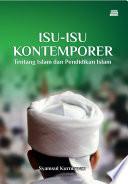PASANG surut perjalanan Islam dan pendidikan Islam jelas tidak akan pernah lepas dari interaksi akumulasi dengan peradaban-peradaban di sekitar perkembangan Islam. Perkembangan Islam dan pendidikan Islam ini juga boleh dikatakan dijiwai oleh semangat normatif dan historis. Disebut normatif, karena perkembangan Islam dan pendidikan Islam umumnya dijiwai oleh ajaran agama yang sumbernya adalah Kitab Suci Al-Qur‘an dan as-Sunnah. Sementara historis, karena wujud respon terhadap berbagai persoalan hidup umat Islam di berbagai bidang kehidupan. Karena itu tantangan yang dihadapi oleh Islam dan pendidikan Islam di zaman kontemporer saat ini jelas jauh berbeda dan kompleks jika ingin membandingkannya dengan tantangan Islam dan pendidikan Islam di zaman klasik atau pertengahan, baik secara eksternal maupun internal. Terutama pendidikan Islam yang perlu didisain untuk menjawab tantangannya, baik pada sisi konsepnya, kurikulum, kualitas sumberdaya insaninya, lembaga-lembaga dan organisasinya, serta mengkonstruksinya agar dapat relevan. Isu-isu kontemporer seputar Islam dan pendidikan Islam inilah yang selanjutnya akan dibahas pada buku ini. Buku ini memuat 10 (sepuluh) esei penulis, yang masing-masing esei membawa isu-isu tertentu yang aktual untuk didiskusikan, yaitu: pertama, Perspektif Umat Islam Tentang Ilmu Agama dan Ilmu Umum: Dari Dikotomi ke Integrasi; kedua, Dikotomi Agama dan Ilmu dalam Sejarah Umat Islam dan Kemungkinan Pengintegrasiannya: Prospeknya di Perguruan Tinggi Keagamaan Islam; ketiga, Masjid dalam Lintasan Sejarah Umat Islam; keempat, Penyimpangan Seksual: Sebuah Interpretasi Teologi, Psikologi dan Pendidikan Islam; kelima, Hak-Hak Anak yang Dirampas: Kajian Terhadap Kasus Perdagangan dan Eksploitasi Anak dalam Sudut Pandang HAM dan Islam; keenam, Nilai-Nilai Pendidikan dalam Jihad; ketujuh, Sekolah Progresif: Relevansinya Bagi Sekolah Bercirikan Islam di Indonesia; kedelapan, Pendidikan Agama Islam Berwawasan Kearifan Lingkungan di Sekolah Dasar: Dasar, Signifikansi dan Implementasi; kesembilan, Pendidikan Karakter dalam Islam: Pemikiran Al-Ghazali tentang Pendidikan Karakter Anak Berbasis Akhlaq al-Karimah; kesepuluh, Neo-Modernisme Islam Nurchalish Madjid: Relevansinya dengan Pembaruan Pendidikan Islam.
... agama Islam amat menekankan pentingnya merawat dan menjaga kelestarian lingkungan. Merusak lingkungan berarti telah ... sekolah, maupun di masyarakat. Maka, sangat mungkin sifat dan perilaku manusia yang doyan merusak lingkungan ...










